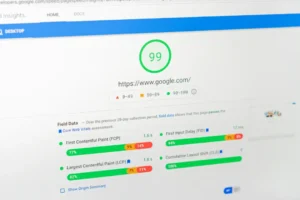
Understanding the Importance of SEO in Digital Marketing
Search Engine Optimization (SEO) plays a crucial role in the realm of digital marketing. It encompasses a variety of strategies and techniques aimed at improving a website’s visibility on search engines. When businesses employ effective SEO practices, they are able to enhance their online presence and attract more organic traffic. With the internet being a primary source of information for consumers, it is imperative for businesses to optimize their websites to ensure they appear prominently in search results.
One of the primary advantages of SEO optimization is its ability to drive organic traffic. Unlike paid advertising methods that can yield immediate visibility but require ongoing investment, SEO focuses on building a sustainable presence over time. As a result, businesses that invest in SEO can benefit from a steady stream of visitors, who are often more engaged and likely to convert. This is particularly significant as the online landscape becomes ever more competitive, making it essential for businesses to employ strategic digital marketing efforts.
Moreover, effective SEO strategies are closely linked with higher conversion rates. By optimizing a website for relevant keywords, enhancing user experience, and ensuring high-quality content, businesses can attract the right audience—those with a genuine interest in their products or services. When visitors find what they are looking for efficiently, they are more inclined to take action, whether that involves making a purchase, signing up for a newsletter, or engaging with the brand on social media. This correlation underscores the importance of SEO in shaping a successful digital marketing plan.
In addition to driving traffic and improving conversion rates, SEO’s impact on website ranking cannot be overlooked. A higher ranking on search engines not only establishes credibility and trust but also creates a competitive edge for businesses. This makes SEO an indispensable element of any digital marketing strategy aimed at expanding reach and fostering growth.
Keyword Research: The Foundation of SEO Success
Keyword research is a pivotal element in the realm of SEO optimization, serving as the groundwork for effective digital marketing strategies. By identifying the terms and phrases that potential customers use to search for products or services, businesses can enhance their website ranking on search engine results pages. This process involves not only the discovery of high-value keywords but also a deep understanding of search intent, ensuring that the selected keywords accurately reflect what users are seeking.
To initiate a comprehensive keyword research strategy, leveraging tools like Google Keyword Planner is essential. This tool facilitates the identification of relevant keywords, their search volume, and competition levels. By entering seed keywords related to a business niche, marketers can uncover a wealth of keyword variations and long-tail phrases that may draw targeted traffic to their website. It is crucial to remember that the best keywords strike a balance between high search volume and manageable competition, enabling better visibility and user engagement.
Once a substantial list of keywords has been compiled, the next step involves analyzing the underlying search intent associated with each term. Understanding whether users are looking for specific information, seeking to make a purchase, or investigating brands determines how to approach content creation. Tailoring content that aligns with the identified intent will not only appeal to users but also improve chances of achieving favorable website ranking. A well-crafted keyword strategy, incorporating both primary and secondary keywords, will lead to more effective SEO optimization, ensuring that content resonates with the target audience.
Ultimately, mastering the art of keyword research is fundamental in navigating the competitive landscape of digital marketing. By establishing a robust keyword foundation, businesses can bolster their online presence and drive meaningful traffic to their websites, which is critical for achieving long-term success.
On-Page SEO Techniques: Optimizing Your Website Content
On-page SEO is a fundamental component in the realm of digital marketing, as it directly influences your website’s ranking on search engines. This process involves optimizing various elements of your website’s content to ensure that it is not only user-friendly but also appealing to search engines. One of the primary techniques is optimizing title tags. Title tags serve as the first impression for your pages on search engines, so ensuring they are concise, relevant, and include target keywords is paramount for effective SEO optimization.
Another critical element is the meta description. A well-crafted meta description not only summarizes the page content but also entices users to click through from the search results. It should incorporate relevant keywords naturally, ensuring that it remains engaging without appearing forced. Furthermore, header tags (H1, H2, H3, etc.) should be utilized to structure content logically, making it easier for both users and search engines to navigate and comprehend the material. Each section should contain keywords and related phrases to reinforce context and relevance.
When it comes to the body of your content, employing keywords naturally is essential. This involves strategically placing keywords in a way that feels organic rather than contrived. Overly stuffing keywords can lead to a poor reading experience and may negatively affect website ranking. Instead, aim for a thoughtful integration of keywords and synonyms, providing valuable, informative content to visitors.
Moreover, enhancing user experience through intelligent website navigation contributes significantly to on-page SEO. An intuitive design allows users to find information quickly, reducing bounce rates, which is beneficial for SEO optimization. By integrating these on-page SEO techniques, you can substantially improve your website’s visibility, driving traffic and achieving success in the competitive digital marketing landscape.
Technical SEO: Enhancing Site Performance and Structure
In the realm of digital marketing, technical SEO plays a pivotal role in boosting website performance and ensuring an optimal user experience. One of the critical components of technical SEO is site speed. Search engines like Google prioritize fast-loading pages, as they contribute significantly to user satisfaction. A delay of even a few seconds can lead to higher bounce rates, ultimately impacting your website ranking. To enhance site speed, it is essential to optimize images, leverage browser caching, and minimize the use of heavy scripts that can slow down loading times.
Another essential element is mobile-friendliness. With a substantial portion of web traffic originating from mobile devices, it is crucial that websites are designed to be responsive. Google’s mobile-first indexing means that it predominantly uses the mobile version of a site for indexing and ranking. Ensuring your site is fully functional across all devices, with appropriate layouts and content adjustments, not only enhances user experience but also positively affects your search engine optimization efforts.
Secure connections, represented by HTTPS, are also a vital aspect of technical SEO. Websites that utilize HTTPS are favored by search engines as they provide a secure browsing experience for users, instilling trust. Implementing SSL certificates to enable HTTPS is imperative, especially for e-commerce platforms where users input sensitive information. This added layer of security not only improves your SEO optimization but also encourages user engagement.
Lastly, incorporating structured data into your website can significantly influence how search engines understand your content. By using schema markup, websites can provide more context to search engines, potentially leading to rich snippets in search results. This can enhance visibility and influence click-through rates, further improving your website’s overall performance.
Off-Page SEO Strategies: Building Authority and Trust
Off-page SEO strategies play a fundamental role in establishing a website’s authority and credibility in the ever-evolving landscape of digital marketing. Unlike on-page SEO, which focuses on factors present within your website, off-page SEO encompasses tactics that occur outside of your web domain. These strategies are essential for achieving better website ranking and enhanced online visibility.
One of the most effective off-page SEO techniques is link building, which involves acquiring high-quality backlinks from reputable websites. Search engines consider backlinks as endorsements; the more quality backlinks a site has, the more trusted it is perceived to be. Thus, a solid link-building strategy can significantly improve a website’s authority, which in turn contributes to its overall ranking on search engine results pages (SERPs).
Social media marketing represents another crucial aspect of off-page SEO. Engaging with audiences on platforms such as Facebook, Twitter, or Instagram helps to increase brand awareness and drive traffic to your website. By sharing valuable content and interacting with followers, businesses can build a community that further enhances their online reputation. This, in turn, can lead to more backlinks and higher authority as more users share and engage with their content.
Influencer partnerships are also vital for off-page SEO optimization. Collaborating with influencers who align with your brand can effectively extend your reach and credibility. These partnerships often lead to organic traffic increase, as influencers’ followers are likely to trust their recommendations, resulting in a ripple effect of traffic and backlinks. By establishing relationships with authority figures in your niche, companies can enhance their reputation and visibility significantly.
Lastly, online reputation management is a key component of off-page SEO. Maintaining a positive online presence protects a company’s reputation and positions it favorably against competitors. By monitoring reviews, managing public relations, and addressing negative feedback, businesses can build trust with their audience, which positively impacts their SEO efforts. Thus, through a well-crafted off-page SEO strategy, businesses can unlock the power of digital marketing and pave their way to success.
Content Marketing: Creating Valuable Content for SEO
Content marketing is a cornerstone of effective digital marketing strategies and plays a vital role in enhancing SEO optimization. The relationship between high-quality content and website ranking cannot be overstated; it is essential for attracting organic traffic and addressing user needs. By creating valuable content tailored to your target audience, businesses can improve their visibility in search engine results and foster engagement.
To begin with, your content should focus on the specific problems and questions that your audience faces. Performing comprehensive keyword research will help you understand what potential customers are searching for, allowing you to produce content that directly addresses their queries. Utilizing various formats such as blogs, videos, and infographics can further enhance engagement and cater to diverse audience preferences. Each of these formats can be optimized for search engines, leading to improved visibility and website ranking.
For example, blogs should offer detailed insights, incorporate relevant keywords naturally, and feature internal and external links where applicable. This not only boosts SEO optimization but also provides readers with additional resources to enrich their understanding of a topic. Furthermore, videos can simplify complex ideas and increase shareability, while infographics can present data visually, making it easier for users to digest. All of these formats should aim to enhance the user experience, which is a significant factor considered by search engines when determining website ranking.
It is also important to update and refresh your content regularly to maintain its relevance and effectiveness. Search engines favor new and updated content, so revisiting older posts to incorporate new information or formats can significantly impact your digital marketing strategy. By prioritizing valuable content in your SEO efforts, you position your website as a trusted source of information, ultimately leading to higher engagement and improved SEO outcomes.
Analytics and SEO: Measuring Your Success
In the realm of digital marketing, analytics plays a pivotal role in refining SEO strategies and enhancing website ranking. Utilizing tools such as Google Analytics and Google Search Console is essential for tracking the performance of SEO initiatives. These platforms provide invaluable insights into user behavior, traffic sources, and engagement metrics, which are crucial for assessing the effectiveness of SEO optimization efforts.
By monitoring key performance indicators (KPIs) such as organic traffic, bounce rate, and conversion rate, marketers can gain a clearer understanding of which strategies are working and which require adjustments. Organic traffic, for instance, indicates the number of visitors arriving from search engine results, serving as a direct measure of SEO performance. A low bounce rate, on the other hand, suggests that visitors are finding the content relevant and engaging, thereby validating the effectiveness of keyword targeting and content strategy.
Furthermore, Google Search Console allows SEO professionals to assess technical aspects, such as site indexing and mobile usability. By regularly reviewing these metrics, marketers can identify potential issues that may hinder website ranking or negatively affect the overall user experience. This data enables informed decision-making, allowing for timely updates that align with evolving search engine algorithms.
Interpreting the data collected through these analytics tools is equally important. Marketers should analyze patterns and trends over time, focusing on how various changes to the website or content affect performance. This process of continuous evaluation contributes significantly to the development of more effective SEO optimization strategies. By embracing a data-driven approach, organizations can fine-tune their digital marketing efforts, ultimately leading to enhanced visibility in search results and improved overall performance in the digital landscape.
Staying Updated: The Evolving Landscape of SEO
In the constantly shifting realm of digital marketing, the significance of staying updated on SEO trends and algorithm developments cannot be overstated. Search engines, particularly Google, frequently modify their algorithms to enhance user experience and ensure relevant search results. Consequently, to maintain and improve website ranking, marketers and businesses must commit to ongoing education and adaptation of their strategies.
One essential aspect of remaining informed about SEO is recognizing the dominance of various resources dedicated to tracking changes in search engine algorithms. Industry-leading blogs, such as Moz, Search Engine Journal, and Neil Patel’s blog, provide insights and analyses of new trends and shifts in SEO practices. By regularly following these resources, digital marketers can gain access to a wealth of information on how to modify their approaches and stay competitive in the online marketplace.
Moreover, participating in webinars, online courses, and industry conferences is advantageous for professionals looking to expand their knowledge. These platforms not only provide updated information on SEO optimization but also foster networking opportunities with other marketers, which can lead to valuable collaborations and knowledge sharing. Engaging with communities on platforms like LinkedIn or dedicated forums also allows one to discuss recent changes and strategies, further solidifying one’s understanding of the evolving landscape.
Another vital component of successful SEO is testing and adapting strategies based on current trends and search engine updates. Periodically reviewing website performance using analytics tools can help identify areas that require enhancement or modification. Tracking improvements in website ranking after implementing new techniques will allow businesses to refine their SEO practices continually. By embracing a proactive attitude towards learning and adaptation, organizations can position themselves to thrive amidst the ever-changing digital marketing environment.
Conclusion
Integrating effective SEO strategies into your digital marketing plan is vital for achieving heightened website ranking and increased visibility in search engine results. Throughout this article, we have explored various techniques that can help you optimize your online presence and enhance your brand’s reach. By understanding the importance of both on-page and off-page SEO optimization, marketers can significantly improve their chances of attracting targeted traffic.
To create a robust digital marketing strategy, businesses must prioritize SEO as a central component. This includes conducting thorough keyword research to identify terms that resonate with your target audience, optimizing website content with these keywords, and ensuring that the site architecture supports both user experience and search engine crawling. Furthermore, high-quality backlinks and social media engagement play a crucial role in establishing authority and trustworthiness in the eyes of search engines.
It is important to recognize that the digital landscape is constantly evolving. Therefore, staying informed about the latest trends and algorithm updates will help you refine your SEO tactics over time. Consistently monitoring your website’s performance through analytics tools can offer valuable insights into what works and what requires adjustment. This iterative process is essential for sustaining long-term success in terms of website traffic and conversions.
In conclusion, the techniques discussed in this article emphasize that SEO is not merely an afterthought but a fundamental aspect of digital marketing that demands ongoing attention. By diligently implementing these strategies and remaining adaptable to changes within the industry, organizations can unlock the full potential of their digital marketing efforts, ultimately leading to enhanced website rankings and improved business outcomes.









